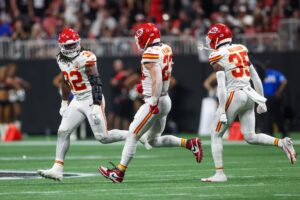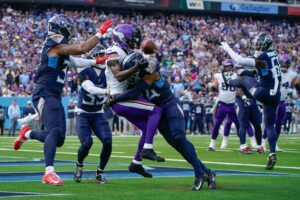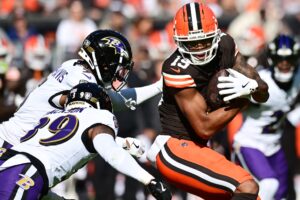The New England Patriots made waves early this morning, acquiring Trent Brown from the Las Vegas Radiers. Brown, of course, played a big role in New England’s sixth championship, and the Patriots obviously want him to be a major contributor to the 2021 Patriots. However, this move will send a ripple across the rest of the New England Patriots roster.
[pickup_prop id=”4366″]
How the Trent Brown Trade Affects the New England Patriots Roster
Marcus Cannon A Likely Cut
Trent Brown played left tackle during his first stint in New England, but that was out of necessity. The Patriots lost Nate Solder to free agency and Isaiah Wynn to injury, so New England needed Brown to protect Tom Brady’s blindside. While he’s certainly capable of filling that role, he is more natural on the right side.
We know Brown is going to grab one of the starting spots, and Isaiah Wynn has played well when healthy. Marcus Cannon, on the other hand, started to show signs of slowing down in 2019 and could have been a cap casualty in 2020 had he not opted out. The Patriots can save just over $7 million in salary cap space by parting ways with the former fifth-round pick, meaning that Cannon could have been on the way out even before the Trent Brown trade. Now that it’s official, three-time Super Bowl champion Marcus Cannon is as good as gone.
Joe Thuney Will Get Paid Somewhere Else
The changes to the offensive line won’t stop there, as Joe Thuney is set to test free agency in the coming weeks. The Washington Football Team used the franchise tag on Brandon Scherff, meaning that Thuney is easily the best guard on the open market.
It’s highly unlikely the Patriots use the franchise tag on Thuney for the second straight season, and New England probably won’t be the highest bidder for the services of the former third-round pick. The Patriots and Thuney reportedly aren’t close to reaching an agreement, which means that New England is already starting to prepare for life without their stalwart guard.
This trade gives New England the ability to maintain a top-five offensive line, even without one of the best guards in the league. Brown and Mason are among the best players at their respective positions when healthy, and Michael Onwenu was one of the best rookies in the league last year. Having Onwenu fill Thuney’s role still gives New England an above-average starter at each position, assuming the team re-signs David Andrews. Speaking of which…
Trent Brown Trade Won’t Stop New England Patriots From Spending
Prior to the trade, the New England Patriots had just over $62.4 million in available spending money. This is huge for the Patriots, as the organization normally doesn’t have the resources to spend big in March. Brown’s new contract will definitely eat into that number, but it won’t stop New England from being aggressive on the open market.
According to ESPN’s Field Yates, Brown agreed to a one-year contract prior to the trade. The deal is reportedly worth up to $11 million, but his cap hit is probably much lower than that. The Patriots are notorious for using “Not Likely to Be Earned” incentives to lower cap hits, and Brown’s contract probably utilizes the same language.
Last year, injuries limited Brown to just five games. Theoretically, New England could throw in a $2 million bonus for playing six games, and this would have no effect on the salary cap. This is nothing more than a guess, but I would assume that Brown’s actual cap number is roughly in the $6-7 million range. Chances are, moving on from Cannon would be enough to offset Brown’s new cap number.
This means that the Patriots will still have the ability to re-sign David Andrews, build a top-five offensive line, and still have all the money they’d ever need in free agency. Considering that most teams are pressed for cap space, look for Bill Belichick and company to aggressively address issues on both sides of the ball.
Main photo:
Embed from Getty Images






